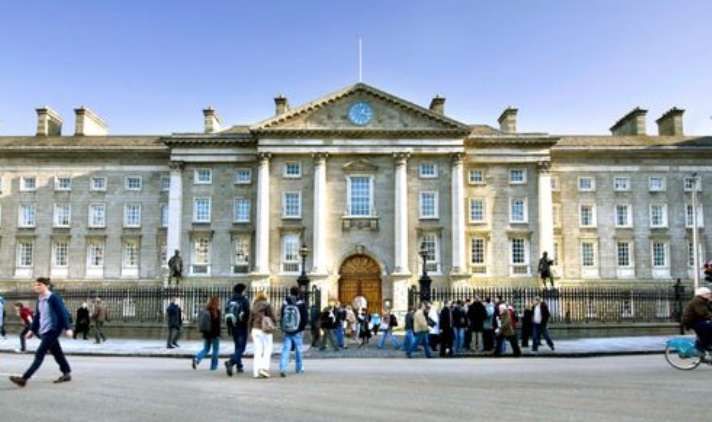Trinity College Dublin (Ireland) Trinity trio win Royal Society University Research Fellowships

The three were successful in the Science Foundation Ireland-funded programme, which is designed to help outstanding scientists realise their potential by becoming leaders in their fields. These long-term fellowships provide salary costs and research expenses for up to eight years and afford awardees the opportunity and freedom to build an independent research career in Ireland or the UK.
Professor Wolfgang Schmitt, Dean of Research at Trinity, said:
“This awards scheme honours high-calibre, early career scientists like Lara, Mark and Matthew, who are pursuing novel and ground-breaking research. It ultimately fosters excellence in research by supporting individuals who are fundamental to the future of global science.
“The winners will now be able to develop their careers at Trinity and, respectively, use the funding to pursue improvements in the way we treat a devastating neurological condition in MND and push the boundaries of our knowledge and application of quantum science and theoretical physics, which promises to deliver key societal benefits in the years to come.”
The winners and their research
Dr Lara Mc Manus, Research Fellow, School of Medicine, will pursue research that seeks to improve prospects for people living with motor neuron disease (MND, also known as amyotrophic lateral sclerosis, or ALS).
This devastating neurodegenerative condition is characterised by loss of motor function, coupled with cognitive and behavioural changes. We now know that this loss of function is associated with changes in activation of specific brain networks, and as the disease progresses, with degeneration of these networks.
One of the major challenges in therapeutics is the absence of quantitative measures to detect very early network disruption and to measure disease progression. This presents a major challenge in the treatment and care of patients. In Ireland, there are currently 420 people living with ALS, with 150 new diagnoses every year.
Lara’s research will develop new markers of disrupted neuroelectric signalling that can detect early signs of motor unit dysfunction and provide a quantitative measure of both different subtypes of the disease, and of disease progression within subgroups of those with ALS.
Dr McManus said:
“The Royal Society University Fellowship Award combines my background in engineering with cutting-edge clinical neuroscience. I’m confident that the work will radically change the lives of people with ALS by speeding up the development of new and better drugs.”
Dr Mark Mitchison, Assistant Professor, School of Physics, will pursue research into the thermodynamics of precision in quantum measurement and control.
Quantum physics underpins the most precise measurement devices that have ever been constructed, such as atomic clocks and gravitational-wave detectors. Moreover, the next generation of quantum technologies — quantum sensors, simulators, and computers — are dependent on exquisitely precise control over microscopic degrees of freedom. But what is the fundamental energetic cost of such precision?
Answering this question is not only crucial for the future scalability and sustainability of quantum technologies, but will also shed light on foundational problems such as the nature of time in quantum theory. Instead of asking “what is time?”, we may ask “how well can time be measured?”.
Mark’s research proposes to tackle these questions by exploiting developments from a new and very active area of non-equilibrium statistical mechanics, known as the thermodynamics of precision. The results will help to improve the precision and efficiency of quantum technologies and may also provide vital clues to some of the most profound problems in science.
Dr Mitchison said:
“I am delighted, honoured, and incredibly proud to receive this award. Thanks to the generous support of the Royal Society and Science Foundation Ireland, I now have the freedom and stability to pursue the research that I am truly passionate about. This significant investment will also bolster Ireland’s capacity in the crucial emerging sector of quantum science and technology.”
Dr Matthew Walters, Postdoctoral Associate, Department of Theoretical Physics at the University of Geneva, will come to Trinity’s School of Mathematics in January 2023. Dr Walters will pursue research into “strongly interacting” systems – an exciting new field.
Most important physical systems in nature are “strongly-interacting”, which means that each moving part has a significant effect on all the others. When interactions are strong, the underlying components can combine to form something completely new; this is how, for example, simple fundamental particles can assemble into nuclei of vastly different elements. Such systems are still poorly understood, and physicists have so far been unable to make precise, concrete predictions about their behaviour.
The aim of Matt’s research is to reshape our understanding of strongly-interacting systems and develop a new approach for obtaining quantitative predictions for experimental results. Matt’s proposal will develop a new theoretical framework which uses the constraints placed by fundamental principles to study general strongly-interacting quantum field theories, providing data which cannot be computed with other traditional techniques.
Dr Walters said:
“The URF is an amazing opportunity to build my research programme and develop new long-lasting connections with the Irish and UK scientific communities. I am very excited to join Trinity and do my best to contribute to its long tradition of academic excellence.”
